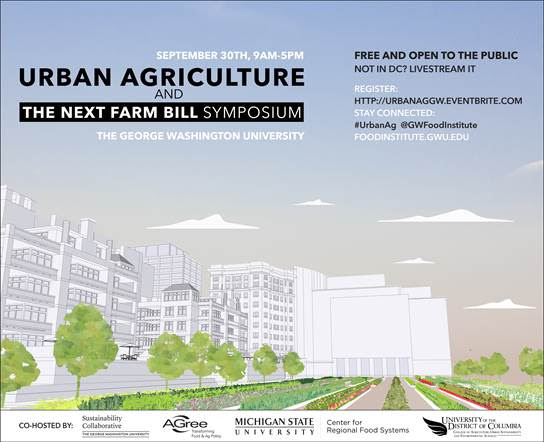The GW Sustainability Collaborative’s annual symposium brings together policy makers, academics, and practitioners to identify current scientific findings and future research questions in the field of sustainability. This year’s conference will focus on the role of urban agriculture in the forthcoming 2018 Farm Bill. The symposium will take place on September 30th, 2016 from 9am to 5pm in the Jack Morton Auditorium on the George Washington University Campus.
The event is co-hosted by three organizations – AGree, Michigan State University, and the University of the District of Columbia. AGree’s mission is to drive positive change in the food and agriculture system by connecting and challenging leaders from diverse communities to build consensus, catalyze action, and elevate food and agriculture as a national priority. Michigan State University’s Center for Regional Food Systems is committed to research, education and outreach to develop regionally integrated, sustainable food systems. The University of the District of Columbia is the only public higher education institution in DC, and the only urban land-grant university in the nation with a College of Urban Sustainability and Environmental Sciences, as well as a College of Agriculture.
Featured speakers include Rep. Marcy Kaptur (OH-9); Elanor Starmer, Administrator of the Agricultural Marketing Service; Nicolas Jammet, CEO and co-founder of sweetgreen; Debra Eschemeyer, former AGree Advisor, Senior White House Policy Advisor for Nutrition, and Executive Director of Let’s Move!; A.G. Kawamura, AGree Advisor and former California Secretary of Agriculture; Tom Forester, Milan Pact Awards Coordinator; Malik Yakini, director of the Detroit Black Community Food Security Network; and many more.
Free and open to the public. Please RSVP here! Also livestreaming at www.foodinstitute.gwu.edu. Please share this event widely with your networks.
Questions? Please email Ariel Kagan, arielkagan@gwu.edu



 n her first year in the Masters of Urban and Regional Planning program at the University of Buffalo.
n her first year in the Masters of Urban and Regional Planning program at the University of Buffalo.